DIVERSE THINKING




Advanced Teacher Status (ATS) is a Professional Status recognised in the Further Education and Training sector.











Undertaking ATS allows you to focus on your personal and professional development and demonstrate your mastery in teaching and learning. improve learner outcomes and make an impact on your organisation.

Apply for ATS: set.etfoundation.co.uk/ats








05 NEWS
Survey on the transformative power of FE, AWD project awardees announced, Technical Teaching Fellowship applications open, and new SET Corporate Partners
08 OPINION
Views from Katerina Kolyva, Martine Ellis and Keri Birch, and a personal account of education behind prison walls
12 ADVICE
How formative assessment is replacing ‘assessment for assessment’s sake’
26 CURIOUS THINKING
Kayte Haselgrove asks how teachers can foster a culture where learners are generally curious about the world
30 LEAN ON ME
Gail Kesslar outlines the key learnings from a Canadian programme designed to help autistic learners to move into further education, and some signposts for the UK
32 TESTING THE THEORIES
What happens when the resarched become the researchers? Maggie Gregson and Paul Kessell-Holland examine the ETF’s Practitioner Research Programme
36 THE FORUM
New member benefits and success in a hybrid event
38 MY LIFE IN TEACHING
Lauren Harris’s journey: from coaching riders to delivering apprenticeships
EDITOR: Nick Martindale
LEAD DESIGNER: David Twardawa
SUB-EDITORS: James Hundleby, Amy Beveridge
PICTURE RESEARCHER: Claire Echavarry
PRODUCTION: Jane Easterman
jane.easterman@redactive.co.uk
+44 (0)20 7880 6248

14 DIVERSE THINKING
Around one in seven people in the UK are neurodivergent, so what adjustments can FE settings make to allow teachers and learners to reach their potential?

18 PROGRESS REPORT

An exclusive interview with Robert Halfon, minister for skills, apprenticeships and higher education
21 SMOOTH TRANSITION
Sixth-form colleges play a pivotal role in FE, with a broad, flexible and often specialist provision
24 MASTERY IN MATHS
The lasting educational legacy of the Centres for Excellence in Maths programme
DIRECTOR: Martin Reid
COMMUNICATIONS OFFICER: Aurélie Leroy
ETF DEPUTY DIRECTOR: Paul Kessell-Holland
PRINTED BY Precision Colour Printing, Telford
157-197 Buckingham Palace Road London, SW1W 9SP membership.enquiries@ etfoundation.co.uk set.et-foundation.co.uk
While every care has been taken in the compilation of this magazine, errors or omissions are not the responsibility of the publishers. Opinions expressed are not necessarily those of the publishers or editorial staff, the Society for Education and Training or the Education and Training Foundation. All rights reserved. Unless specifically stated, goods or services mentioned are not formally endorsed by the Society for Education and Training or the Education and Training Foundation, which do not guarantee or endorse or accept any liability for any goods and/ or services featured in this publication.
ISSN: 2050-8980
Neurodiversity is something we’re all hearing a lot about, and seems to be finally getting the attention it warrants.
It’s thought that as many as one in seven people could present as neurodivergent, a term that covers a range of conditions including dyslexia, dyspraxia, social anxiety and attention deficit hyperactivity disorder.
Our cover feature on page 14 of this issue looks at what this means for teachers, and how the further education (FE) sector can go about harnessing the talent of everyone working in the sector to ensure they can flourish.
One part of the sector used to helping people reach their potential is sixth-form colleges, in part by providing a fresh environment for post-GCSE learners. Our feature (page 21) explores how they fit into the mix, and some of the challenges on the horizon.
The government has pledged to put FE at the heart of its post-Covid recovery efforts, and there’s been plenty for Robert Halfon, minister for skills, apprenticeships and higher education, to get his teeth into since his return to the Department for Education in October last year. In an exclusive interview with inTuition on page 18, he outlines his vision for both T Levels and apprenticeships, as well as the future for adult education.
One of the aims of inTuition is to help share learning, fuelling debate and innovation that could
help to transform how others approach teaching, with the aim of raising standards across the board. Our Knowledge section features a piece from Gail Kesslar, at Canadian organisation Autism CanTech!, who shares her experiences of helping learners move into FE, and ultimately into employment. You can also find out more in this issue about our #TogetherWeTransform initiative. Following on from the findings of research by the Education and Training Foundation and Society for Education and Training, it demonstrates the ability of the FE and training sector to positively impact on the lives of learners. It’s the topic of our CEO Katerina Kolyva’s column, and you can also read an inspirational story from the prison sector on page 11.
On the topic of research, I’d also like to thank those of you who took part in the recent reader survey. We must be doing something right as 82 per cent of you rated inTuition as either ‘excellent’ or ‘good’, but this has also provided some useful information that will help us to shape the direction of the journal going forward. In the meantime, I hope you all have a wonderful summer!
MARTIN REID, director of professionalism and customer experience, Education and Training Foundation

ONE OF THE AIMS OF INTUITION IS TO HELP SHARE LEARNING, FUELLING DEBATE AND INNOVATION WITH THE AIM OF RAISING STANDARDS ACROSS THE BOARD
With one in seven people presenting as neurodivergent, it’s time the further education and training sector adapted to help ensure teachers and learners can thrive
New research from the Education and Training Foundation (ETF) and the Society for Education and Training (SET) highlights the transformative impact that further education and training has on the lives of learners across the UK. The research is released as the ETF and SET launch the #TogetherWeTransform initiative to champion those in the sector.
The ETF and SET’s survey of 2,000 UK adults found that the majority have witnessed the transformative power of FE and training in some way. Two-fifths (40 per cent) have taken part in some type of FE and training themselves, and 56 per cent know someone who has.
Other key findings from the research include the following:
Almost nine in 10 (88 per cent) of those with a friend, family member or colleague who’s taken part in FE and training found it to be a positive step for that person in developing a career
More than four in five UK adults (82 per cent) agree that FE and training can be useful in advancing or finding a career or job
Over two-thirds (68 per cent) would consider undertaking a FE or training course to boost their skillset
Read the full research report at et-foundation. co.uk/wp-content/uploads/2023/03/Togetherwe-transform-research-summary.pdf
To hear from FE teachers and trainers about how #TogetherWeTransform, visit et-foundation.co.uk/together-we-transform
The Education and Training Foundation (ETF) is proud to have supported 34,341 activities as part of the T Level Professional Development (TLPD) offer, funded by the Department for Education, since the pilot phase began in 2019.
Between May 2019 and January 2023 more than 18,000 individuals have participated in the programme.
Of those who accessed the TLPD offer in the academic year 2021-22, 95 per cent of survey respondents said it would have a positive impact on their professional practice.
One said: “I found the speakers inspirational and knowledgeable. It filled me with confidence to begin to deliver an excellent T Level experience.”
The TLPD offer for 2022-23 includes new opportunities for schools preparing to deliver T Levels, and aims to meet the needs of the workforce alongside relevant regional, employer and curriculum requirements.

New course offers this academic year include the Assessment in T Levels course, launched in early March 2023.
Find out more about the TLPD offer at et-foundation.co.uk/professionaldevelopment/t-levels
Receive regular updates from the ETF on new and updated CPD courses and resources as well as selected topic areas. Sign up at et-foundation.co.uk/ newsletters
The Research Further project, supported with funding from the Education and Training Foundation (ETF), has announced grant awards for five new scholars to support practitioners in colleges to carry out postgraduate or doctorate-level study.

The scholars will undertake a range of study projects across various important topics, including occupational culture and early careers teachers in further education, at several universities. These projects will be conducted alongside their existing day jobs with the support of their colleges, who have committed to granting the scholars remission time for their studies.
In their first year, the 15 current Research Further scholars have already contributed to several conferences and webinars, engaged with policymakers and stakeholders, and are working on academic papers and publishing widely read thought leadership pieces.
The new scholars are as follows:
Suki Dhesi, vice-principal at HSDC
Lliam Dickinson MSET, higher education pathway leader, Barnsley College
Lynette Leith MSET, vice-principal curriculum, Hull College
Stephanie Marshall-Whitley MSET, beauty therapy tutor and lecturer, Truro and Penwith College
Amy Woodrow, teaching and learning manager, City of Bristol College
The Education and Training Foundation (ETF) has been awarded a contract from the Department for Education to deliver an enhanced programme of support to strengthen leadership and governance capability and capacity within the FE sector in England until 2025.
This contract award builds on the ETF’s highly successful leadership and governance programmes that, since 2017, have helped to build a cadre of experienced leaders and governors for the sector.
Working in partnership with the sector, the ETF will support the
career progression of individuals from aspiring to strategic leaders.
Dr Katerina Kolyva, CEO of the ETF, said: “Effective leadership and governance are crucial to enable the sector to thrive, and we welcome the opportunity to work closely with our sector partners to deliver this ambitious programme of support to existing and aspiring leaders and governors across the sector.”
For more details on our programmes, visit et-foundation.co.uk/professionaldevelopment/leadership-andgovernance-programmes
Applications are now open for the 2024-25 Technical Teaching Fellowships.
Awarded by the Education and Training Foundation (ETF) and Royal Commission for the Exhibition of 1851 following a rigorous selection process, the fellowships are open to exceptional technical
teachers in the FE and training/post-16 sector. Following a review of the impact of the Technical Teaching Fellowships programme since its inception in 2018, the fellowships are now included in the Royal Commission’s portfolio of permanent awards.
The decision means that an increased number of ETF–Royal Commission Fellowships – up to six – will be awarded for 2024-25. It also means an extension of the geographical reach of the fellowships, with applications welcome from practitioners demonstrating excellence
working in England, Northern Ireland, Scotland and Wales.
The deadline for applications is 5pm on 24 November 2023.
Further details are available at et-foundation.co.uk/professionaldevelopment/technicaleducation/technical-teachingfellowship-ttf-programme
In April, the awardees of the Apprenticeship Workforce Development (AWD) programme’s six-month funded projects were announced. These projects provide a ‘safe space’ to research and experiment with new approaches to improve the quality of apprenticeship delivery.
Twenty projects were awarded in total, including 10 individual practitioner improvement projects and 10 collaborative projects.
Project awardees have access to up to £5,000 funding for each practitioner improvement project, and up to £20,000 for each collaborative project. Throughout their projects, participants will be supported by AWD project mentors, who will provide advice and guidance on understanding the research and project processes, defining and setting up the project, reporting and more. Projects will run from March to October 2023 and are part of the Department for Education-funded AWD programme. This is delivered by the Education and Training Foundation, in partnership with the Association of Colleges, Association of Employment and Learning Providers, Strategic Development Network and University Vocational Awards Council.
Find out more at et-foundation.co.uk/news/apprenticeship-workforce-developmentproject-awardees-announced
The Education and Training Foundation has been accredited to the matrix Standard in recognition of its high-quality information and guidance services to the further education and training sector.
The matrix Standard is the international quality standard for organisations that deliver information, advice and/or guidance, either as their sole purpose or as part of their service offering. It is owned by the Department of Education and managed by The Growth Company.
Further details about the ETF’s accreditation are available at et-foundation.co.uk/news/the-etfachieves-matrix-standard-accreditationin-recognition-of-services-to-fe-sector
17
The number of additional prisons expected to take part over the next four years in the HMP Academies programme, which aims to get prisoners into work
54%
The proportion of apprenticeship providers requiring intervention, prompting calls to review assessment methods
95%
The Society for Education and Training is delighted to introduce its new Corporate Partners: Technical Professionals Limited, since March 2023, with 25 memberships
United Colleges Group, since April 2023, with 300 memberships
Liverpool Adult Education, since April 2023, with 50 memberships Martin Reid, director of professionalism and customer experience, said: “Our partnership provides teaching staff with expertise and resources as well as CPD opportunities. We look forward to supporting our new members in striving for excellence.”
Further information about SET Corporate Partnerships can be found on the SET website at set.etfoundation.co.uk/membership/ set-corporate-partnerships
The proportion of colleges reporting a rise in mental health disclosures among 16- to 18-year-olds, a study by the Association of Colleges finds
£25,000
The amount employers can claim in ‘legitimate costs’ running T Level placements. The DfE has made £12 million available
£286m
FE Capital Transformation Programme funds for 146 colleges to spend on new buildings and upgrades
Research by the ETF and SET has revealed just how powerful further education and training is in changing the lives of learners, as well as providing valuable insight into the support the sector needs going forward, says
It has been a whirlwind of a few months since I joined the Education and Training Foundation (ETF). Within my first few months I have been privileged to witness the transformational impact further education (FE) and training has on lives and communities during my visits to colleges, training providers and meetings with our partner organisations working across the sector.
I have seen many humbling and inspirational examples of how communities of practitioners are working collaboratively with the industry and within their local communities to support learners and best meet local skills needs. I have witnessed the unwavering commitment of practitioners and the real transformational impact that FE and training is having on learners, no matter how challenging things can be.
The significant positive impact that FE and training has on society is evidenced by new research from the ETF and the Society for Education and Training (SET). The survey of 2,000 UK adults found that the majority have witnessed the transformative power of FE and training in some way.
Two-fifths (40 per cent) have taken part in some type of FE and training themselves, and 56 per cent know someone who has. It is no surprise to me that the research found that almost nine in 10 (88 per cent) of those with a friend, family member or colleague who has taken part in FE and training found it to be a positive step for that person in developing their career.
In addition, over four in five UK adults (82 per cent) surveyed agree that FE and training can be useful in advancing or finding a career or job, and over twothirds (68 per cent) would consider undertaking a FE/training course to boost their skillset.
My commitment to you is to ensure that the ETF and SET’s work can continue to best support the needs of all in the sector, so that together we can continue to deliver that transformational impact. Our recently launched #TogetherWeTransform initiative highlights the stories behind the transformative impact that FE and training is having on the lives of learners across the UK. Do take a look at the inspiring stories from practitioners across the sector at etfoundation.co.uk/ together-we-transform and support our
#TogetherWeTransform initiative on social media.
Delivering transformational opportunities to learners, day in, day out, brings its own set of challenges. Our sector is dealing with complex challenges in a climate of rapid policy change and financial pressures in terms of funding and the cost-of-living crisis. The recent announcement of delay to the rollout of some T Levels adds another layer of uncertainty for practitioners and learners alike. Faced with competing demands, we as professionals have little time to dedicate to the very important aspect of looking after ourselves and prioritising our professional needs.
Here at the ETF and SET we have been reflecting on the learning from our sectorwide listening exercise and focusing on the practical contribution we can make to help ease some of the challenges you face. Alongside our comprehensive leadership, training and support programmes to teachers and trainers across the sector, we will shortly be announcing an exciting new e-learning platform to ensure that our support is accessible to an even wider cohort of practitioners. I will be able to let you know more detail on this in our Autumn issue of inTuition
As we look ahead, we will continue to draw from the insight gathered over the past few months and will be announcing a new strategic direction in the autumn, with a focus on ensuring we work with the sector and for the sector.
We will continue to listen to our sector colleagues to ensure we work in partnership to make the most valuable contribution possible to supporting the workforce.
Working together, we want to ensure that we are meeting the needs of every practitioner, in whatever FE and training setting they work, so that they can focus on continuing their transformative work to help learners achieve their potential.
KATERINA KOLYVA is the chief executive of the Education and Training Foundation



Katerina Kolyva
MY COMMITMENT TO YOU IS TO ENSURE THAT THE ETF AND SET’S WORK CAN CONTINUE TO BEST SUPPORT THE NEEDS OF ALL IN THE SECTOR
CHATGPT
ChatGPT can also help with providing feedback on student work. Although it cannot completely replace a teacher’s personal touch, it can provide a solid foundation for you to build on. Use ChatGPT to generate initial comments on assignments, then add your personalised input to ensure the feedback remains genuine and relevant.
Other use cases in education include outlining strategy and policy documents; drafting complex emails; compiling word lists; writing role-play scenarios; and creating multiple choice questions from videos.
The main strategy I’ve used for managing my workload over the past few months is delegation. As a result, my wellbeing has soared. I wouldn’t blame you for thinking, “Good for you, Martine, but I have no one to delegate to.” Well, technically, neither do I. I’ve been delegating to artificial intelligence (AI), specifically ChatGPT.
There’s been much talk in education circles about ChatGPT and other AI tools recently. Understandably, there’s fear around ethics, student use and plagiarism. However, my overwhelming feeling is optimism because ChatGPT can save teachers so much time. It can be an invaluable tool for teachers looking to reduce their workload and improve their overall wellbeing.
I want to spark your curiosity with this article and share my optimism, along with some actionable ideas for what you can delegate to AI today. We will focus on ChatGPT; however, there are many other AI tools to explore, such as Copilot, designed with educators in mind.
ChatGPT is an AI language model developed by OpenAI. It can understand and respond to human language, making it an ideal tool to help with various tasks. The technology behind ChatGPT is based on natural language processing (NLP), which enables it to comprehend context, make inferences and generate coherent responses. At the time of writing, ChatGPT is free with the option of a paid subscription upgrade.
According to the 2022 Teacher Wellbeing Index by Education
Support, 68 per cent of staff have considered leaving education due to workload. ChatGPT can significantly impact teacher wellbeing by reducing workload and the need for long workdays, and creating opportunities for relaxation and personal interests.
When considering what AI can help you with, remember that it excels at “doing” rather than “thinking”. Dan Fitzpatrick (@DanFitzTweets on Twitter) encourages us to PREP the machine to get high-quality responses from ChatGPT:
P: prompt it
R: give it a role
E: give explicit instructions
P: provide clear parameters.
For example, you can delegate writing session plans to ChatGPT, but you must think clearly about what the plan needs to achieve and how. The session plan will be better if you give ChatGPT good instructions. With careful PREP, ChatGPT eliminates the blank page and gives you a solid starting point for your session plan. You just need to review it and make adjustments.
As with all technology, there are benefits and drawbacks. As well as saving you time, ChatGPT can provide consistent output, ensuring that resources and feedback adhere to a uniform standard. Furthermore, AI is available 24/7, allowing you to work on your schedule and at your own pace.
A drawback is ChatGPT’s limited understanding; while it is undoubtedly powerful, it may not fully understand complex concepts or the nuances of human language. Always review its output carefully.
There are also some ethical concerns due to the potential for misuse, such as plagiarism or students relying too heavily on AI-generated content. This is understandable, and I suspect similar to the fear educators experienced when Google first emerged.
We must educate our students on the responsible use of AI tools and be open to a different approach to assessment. Technology could help – Turnitin, for example, has developed its first iteration of AI detection software. However, I believe focusing on policing AI would be a mistake – it’s here to stay. Soon we will think of AI in the same way that we think of spellcheck.
P.S. Did ChatGPT help me write this article? You’ll just have to guess…
MARTINE ELLIS FSET ATS is a teacher, writer and lifelong learner
@MartineGuernsey

The use of artificial intelligence has the potential to make teachers’ lives easier, contributing to an increase in wellbeing. But it’s important to know the limits, says Martine Ellis FSET ATS
SOON WE WILL THINK OF AI IN THE SAME WAY THAT WE THINK OF SPELLCHECK
A relatively new addition to the UK’s FE sector, forest schools can help learners develop new skills, harness an interest in the environment and improve mental wellbeing. But there are a number of myths that need dispelling, says Keri
Birch MSET ATSForest school is not a new phenomenon, but as it started in Scandinavian countries, it seems new to the UK, and particularly the FE sector. The Forest School Association defines it as “an inspirational process that offers learners regular opportunities to achieve and develop confidence and self-esteem through hands-on learning experiences in a woodland or natural environment with trees”.
There are many myths about forest schools that need dispelling. One is that a large area of natural woodland is needed, which learners have to travel to, costing time and money. Forest schools can take place in small areas, built for the purpose on-site.
The principles of forest school are that it is in a woodland setting (but can be newly planted), it benefits holistic development and risktaking, it is learner-centred and it is led by professionally trained and qualified leaders.
There are many known benefits of forest schools, including supporting sustainability and citizenship, engaging learners that excel outside a classroom environment, developing character and gaining hands-on experience.
College students of all ages love the freedom of the outdoors, making them happier and healthier people. I have found that social skills are developed by forest schools as students interact, co-operate on projects and gain
autonomy through decision-making. Mental health is improved by having a ‘change of scene’, which supports academic performance.
There is a misconception that learners with special needs will be in danger, or even be dangerous, in the forest school environment. Those with special needs benefit from forest schools because they are taught the skills to handle tools correctly and use them for practical purposes. Learners with special needs develop confidence in their own achievements, seeing the results of planting seeds, building bug hotels or cooking on a fire.
There’s another myth that forest schools are a waste of money for sunny days and occasional use, but in fact they are for all weathers and all times of the year. Learners enjoy going out in the rain and cold, seeing the changes that take place in every season. This builds resilience and a can-do attitude to problem-solving and creative thinking.
FE students themselves can help to create the environment, giving them
a sense of ownership, which will help them to identify with nature and value the diversity of the insects, plants, trees and animals they encounter. They become more eco-aware through considering sustainability within their own forest schools, which contributes to climate change awareness.
The forest school environment develops real-life problem-solving in FE students, from small problems such as low-hanging branches to larger ones such as waterlogged ground. They learn to manage risk, and the exposure to a dynamic environment helps them to become adaptable in their approach to real-life problems.
Having this break from technology and time away from the hustle and bustle of life helps students to ‘reset’ their minds and bodies. Learners often remark they sleep better and feel less stressed on days when they ‘do’ forest school. Mental health is improved by exposure to outdoor environments, and forest schools aid this.
Academically, forest schools benefit FE students too. At our college, we have a nursery on-site so learners have arranged sessions for the early-years children. This gives them employability skills that develop their confidence and communication with young children. Other academic links include collaboration and developing teamwork with other departments across the college, such as carpentry and design and technology where various signs, bird tables and other additions were designed and built for the forest school area.
FE students do not ‘play’ at forest schools, but rather benefit from the many skills they acquire including employability, teamwork and practical skills, interacting with nature and discovering themselves.
KERI BIRCH MSETATS is an early years lecturer and advanced practitioner at WalsallCollege


STUDENTS THEMSELVES HELP TO CREATE THE ENVIRONMENT, GIVING A SENSE OF OWNERSHIP
The #TogetherWeTransform initiative showcases the work the FE and training sector does to improve lives and communities. We hear from one practitioner who is helping to enhance the life chances of prisoners
Research by the Education and Training Foundation (ETF) and the Society for Education and Training (SET) has shown that the vast majority of UK adults have witnessed the transformative power of FE and training in some way (96 per cent have either taken part themselves, or know someone who has).
Building on these findings, the #TogetherWeTransform initiative, launched by the ETF and SET, is bringing to life the incredible stories of the teachers, trainers and leaders whose everyday work transforms the lives of learners.
Sarah Jones is the operations manager and neurodiversity lead for People Plus, an education provider operating in 22 prisons across the East of England and the North and East Midlands. Her story is one of many that are being highlighted as part of the #TogetherWeTransform initiative.


Here, she tells us about her own experiences of being a teacher, and her passionate belief that creative teaching can change the hearts and minds of learners at any age.


Why I decided to teach
I had the most inspirational Year 6 teacher. His creative teaching style influenced my decision to step into the world of teaching. After a couple of years as a geography teacher in a secondary school in Solihull, I became the special educational needs co-ordinator (SENCO).
As SENCO, I worked with other teachers, social workers and specialist teams to create a personalised package of support for students who had
neurodiverse and inclusion needs. I am so proud that we helped so many children progress through school.
Challenging perceptions
I didn’t know a lot about prison education before I joined the amazing team at People Plus. People don’t see the great work that is happening behind prison
well as develop core functional skills such as maths and English.
The wing environment is often noisy, so having a designated space where people can go to learn and access education gives prisoners the drive and determination to become learners.
New ways to learn and connect
Prison education gives us the time and flexibility to tap into potential that was perhaps not identified and nurtured in mainstream education.
For example, I worked with someone who had one wish: to read Guess How Much I Love You to his daughter. It was a long journey, but step by step we taught him to read. During Covid he had a video call with his daughter and managed to read to her for her bedtime story. Those positive moments have a ripple effect on the entire family. They are worth their weight in gold.
walls, so how can we expect them to understand the incredibly positive experiences that are taking place?
Prison education provides a varied and wide curriculum, routine and structure, and the social interaction with their peers that helps prisoners to model the behaviours that will support them on release.
I’ve been fortunate to witness some incredible examples of how education in prisons is enabling access to new skills and opening up employment opportunities. Prisoners can study vocational courses like plumbing, plastering and electrics, as
Does it work all the time? Sometimes it doesn’t, but if you can make a difference to one prisoner, then you’re also transforming the lives of their families and hopefully making a positive impact on the community they live in too.
We’re all educationalists, and we’re all working towards the same goals, so let’s make sure that prison education has a seat at the table alongside incredible teachers from other settings.
Find out more about our #TogetherWeTransform initiative and how you can get involved at et-foundation.co.uk/together-we-transform
I’VE WORKED WITH SOMEONE WHO HAD ONE WISH: TO READ ‘GUESS HOW MUCH I LOVE YOU’ TO HIS DAUGHTER
The word ‘assessment’ does not always carry a positive connotation. Traditionally, an assessment is a single task, or series of tasks, often graded, which leads either to success or to needing to complete the assessment again. Reflecting on how the further education sector is moving away from unit-based teaching to more holistic curricula, the traditional process of unit-based assessment, or ‘assessment for assessment’s sake’, seems to, fortunately, be moving into the past.
Yet this creates the unfortunate possibility of assessment being missed, for learning not to be checked. Perhaps worse, that assessment is only seen as formal or summative. Formative assessment is crucial in identifying the progress of an individual and groups of learners. Through successful formative assessment, teachers are able to check learning and structure lessons to boost retention and improve learner motivation.
When we consider the word ‘assessment’, we may think of tests or exams, and both words, again, may not bring positive feelings to learners. But when we think of games, quizzes, competitions, teamwork and, dare we say, fun, the whole meaning of what assessment is changes.
This is what assessment can be: not only a tool to check learning but a catalyst for bringing positive energy back to the learning environment, where learners can improve their understanding of a concept while enjoying the activity itself.
Gamification, flipped learning and teamwork could bring much needed spark back to assessment while improving the problem-solving skills of learners. Done correctly, in a low-stakes environment, we can use activities that build the resilience and confidence of learners, in tandem with checking learning and improving digital competency. The following tips can help you go about it...
Assessment should help engage learners as well as check progress. The key, says Nathan Rogan MSET QTLS, is to make it fun
Using EdTech tools which save ourselves, as teachers, time, while tracking learner progress, is so valuable. Formative.com is a free tool that allows the teacher to create full lessons of content, with activities, and the ability to track learner activity ‘live’.
The platform even allows learners to draw, write essays or simply answer questions, with a comprehensive self-marking tool and the ability to give instant feedback, allowing learners to track their own progress. For setting outside the classroom, or flipped learning assessment, Formative is a valuable EdTech platform to keep in the toolkit.
Error-correction is often overlooked as an assessment in itself. But done in a fun way, it can really tune learners’ higher-order thinking skills. By evaluating deliberate mistakes or differentiating incorrect from correct statements, learners can collaborate, discuss and evaluate information. Auctioning off true or false statements to learners, whereby they have a set ‘budget’ and must ‘bid’ to buy correct statements, sums or sentences, can add a competitive element to a traditional activity. This also sees learners actively engage with error-correction: using reasoning and logic to assess the incorrect nature of statements.




Not all learning environments have access to digital tools, yet a combination of low-tech and EdTech assessment can benefit any group of learners, providing variety. So often, we forget the value of tools like mini-whiteboards or red/ green cards to check learners’ understanding of a topic, while encouraging learners to ‘have a go’.
Low-stakes assessment like this can help learners to see that, while they might not have got the answer correct, they tried, and no damage was done, thus potentially boosting resilience.
Using videos as a teaching tool has become almost second nature in education, but how often do we use these as a tool for formative assessment? Creating some pre-watching questions could focus learners’ attention on the most important parts of videos. Similarly, EdTech platforms such as Nearpod allow questions to be embedded into the video itself, making learners choose an answer and getting instant feedback, before being allowed to continue watching, rather than passively viewing the content.
Making formative assessment fun could really boost motivation in learners while improving their retention of a topic: after all, if an activity is fun and memorable, learners will probably remember it better.
Gamification of assessment, through the use of realia and props, can bring energy to a lesson: while Wordwall allows any activity to be turned into a selection of games, such as ‘whack-a-mole’, card-sort activities or a gameshow style quiz. There is no need for assessment to be boring!
SET has produced a webinar on Using Edtech Assessment Tools for Effective Exam Revision. SET members can access this on demand at set.et-foundation.co.uk




When Martine Ellis FSET ATS shared her autism diagnosis with her colleagues, many of them expressed shock and disbelief. “They told me I didn’t ‘look’ like I had autism, or that I looked ‘normal’. But autism presents differently in everyone – it doesn’t have a ‘look’,” she explains.

Ellis had felt she may have had autism for some time, and for many years had been ‘masking’ her symptoms so she could appear neurotypical, but this was exhausting. “I wondered why I was so tired, why I seemed to need more sleep than everyone else,” she adds.















Her employer, Guernsey College of Further Education, has made a few adjustments, such as allowing




her to work from home without prearrangements, but she mainly selfmanages her symptoms, which include high sensitivity to noise or asking for clarity in meetings. On the days she teaches, she adjusts her work pattern to ensure her energy levels don’t run out.




Ellis is comfortable sharing her diagnosis with her team and asking for help, even if it took many years of her career to do so. But most workplaces could do more to ensure they are more accepting of neurodiverse staff, and students. A study by the Centre for Neurodiversity at Work at Birkbeck University found that almost two-thirds (65 per cent) of staff did not discuss their neurodiversity because they feared discrimination from management, 55 per

cent worried about what colleagues would think, and 40 per cent felt other staff were not knowledgeable enough to help them.
Birkbeck’s research highlighted that neurodivergent employees have highly sought-after abilities and work strengths, with over 80 per cent reporting hyperfocus on tasks, 78 per cent on creativity, 75 per cent around innovative thinking, 71 per cent with detail processing and 64 per cent being more authentic at work. As Professor Nancy Doyle, one of the research leads, points out: “These qualities speak directly to the World Economic Forum’s reported top skills for 2025. The world of work needs people who can create and are divergent thinkers – neurodiverse workers bring exactly this.”
With around one in seven people in the UK believed to be neurodivergent, it’s vital FE settings put in place measures to help support teachers and learners so they can make the most of their potential. Jo Faragher reports on what adjustments can be made
elieved to be measures to help the most of their
“Getting a diagnosis has been tremendously empowering for me, and autism is a massive part of my identity,” Ellis says. She feels there are many positives to her autism, including being more focused and self-motivated. “I share it with students too because it’s important that they have role models, that there is visibility,” she adds.
But how open a member of staff or student can be about being neurodivergent can depend on how inclusive the culture is to begin with. Open-plan environments can often impact levels of concentration in individuals with conditions such as autism and ADHD, for example, and the pressure teaching staff can often face to be ‘constantly available’ can drain energy levels that are already depleted. “Having policies at organisational level about, for example, not sending emails after certain times can create boundaries that serve neurodivergent people well,” adds Ellis.
Diversity consultant Monica McCoy, founder of Monica Motivates, says workplace culture is crucial so neurodivergent people feel comfortable asking for help and being themselves at work. “There is a real increase in innovation, creativity and employee engagement that comes from bringing together differences, whether neurological, or to do with background, immutable physical characteristics, socio-economic factors, age, sexuality or something else,” she says.
Teachers, of course, are not the only people in educational settings who may be neurodivergent. Many further education (FE) professionals will be supporting students with a range of neurodiverse conditions, and there is a growing range of resources and training available to ensure their approach is as inclusive as possible (see panel on opposite page).
Teachers can draw on a range of strategies during teaching time itself, but many of the most impactful adjustments for learners come from the physical environment, explains Rhonda Janes of the Autism Education Trust. “Many people with autism or other conditions
Neurodiversity refers to how everyone’s brain develops and works in different ways, leading to differences in how we learn, think and experience the world, explains diversity consultant Monica McCoy. “In organisations, neurodiversity has most often focused on autistic people,” she says.
“But many autistic people, as well as those who have other neurodivergent conditions such as dyslexia, dyspraxia, social anxiety or ADHD, show aboveaverage ability in certain areas.”
These areas can include memory, maths and pattern recognition, which are highly desirable, she adds, so it’s important to create the conditions for people with these skills to thrive.
Neurodiversity is an umbrella term used to cover a number of conditions, and the symptoms for each can vary. Some typical strengths and weaknesses follow, but it’s important to remember

individuals will experience aspects of their own neurodiversity differently.
Autism: avoidance of eye contact, non-verbal communication difficulties BUT detail-oriented, ability to identify patterns, ability to focus for long periods, highly intelligent
Dyslexia: confusion with letters, may need support with reading or writing BUT highly creative, improved visual processing
ADHD: poor organisational skills, BUT hyper-focused on tasks, highly motivated
Dyspraxia: problems with movement and co-ordination, poor posture and can get fatigued easily BUT able to develop strategies to overcome difficulties, good problem-solving abilities
have sensory needs, so setting up the classroom in the right way makes a huge difference,” she says. “Many may have encountered challenges already getting up in the morning or dealing with public transport, for example.”
Asking students what they need, rather than assuming a certain adjustment will work because another autistic student responded to it, is the best strategy. “Ask them what their needs are, what they hope to get out of the course or class, and what can be changed to help them,” she adds.
Many environmental adjustments such as minimising background noise benefit all students, not just those who are neurodivergent, says Janes. Furthermore, some students may be awaiting a diagnosis, be unaware they have autism or another condition, or masking, which is why a more holistic approach can be effective.
McCoy also advises a tailored approach that does not make assumptions about what certain students can cope with. “One principle is to recognise that people can tolerate different levels of stimulation, and that headphones or ear defenders can allow certain neurodivergent people to shut out auditory stimulation in order to work effectively and at their best,” she says.
“Privacy rooms can serve a similar purpose, and flexible working conditions can empower neurodivergent people to decide for themselves if they need to be in a certain environment to work well. It’s also really important that in the pursuit of a stronger culture, organisations don’t put pressure on neurodivergent people to socialise. This can be a real source of anxiety.”
FE settings have a vital role to play in helping prepare neurodivergent learners for the workplace too. Weston College is one of four national Centres for
Excellence in Special Educational Needs and Disabilities (SEND), and part of a network of around 3,000 communities of practice where practitioners connect and share effective practice. One of its key focuses is improving employment outcomes for students with SEND, which includes training neurodivergent learners in basic employability skills they can use in a wide range of employment options.
Its Supported Employment Excellence Hub works with employers and learners to give them the chance to experience the world of work, making real money and interacting with customers. Sam Mayhew, director of SEND at the college, explains: “The learners we work with want to work and can work, and as the labour market diversifies and expands in flexibility, creativity and inclusion, it is time for curriculums to adapt to ensure that we are preparing young people for the world of work through experiential and concrete ways.”
The college also operates a specialist support model for students with autism. Practitioners who have specific qualifications in supporting neurodiverse individuals work with parents and external partners to develop strategies for each student.
Unlike some settings where students would have support in-class from an assistant, Weston holds one-to-one tutorials outside the core curriculum to help them to adapt. The pandemic posed some issues in terms of learners getting used to the technology and their routine being disrupted, but many now prefer having a distance education element to their learning, according to Leila Morne, autism strategic lead.
In college, a ‘low arousal’ campus means students with autism feel more comfortable, and parental participation has increased since Covid. The college has also been working with students with
Tourette syndrome, offering a bespoke learning scheme that aligns with these students’ interests rather than forcing them into a rigid study programme.
Mayhew stresses the importance of creating an “enabling environment” that focuses on difference rather than deficit.
“Teachers must skilfully and sensitively utilise learners’ strengths and interests in order for them to succeed and flourish, addressing their needs, aspirations and vocational focus as they develop strategies and transferable skills,” she concludes.
“Working in collaboration with SEND specialists, we can accommodate their differences and inform others how they learn most effectively.”
The Education and Training Foundation offers a vast array of support, including bespoke support from our Centres for Excellence in SEND. A range of resources supports settings with neurodiverse staff and students, including recordings of webinars on aspects of neurodiversity such as autism and Tourette syndrome et-foundation.co.uk/professionaldevelopment/special-educationalneeds-disabilities
The National Association for Special Educational Needs (nasen) offers continuing professional development and support for teaching staff nasen.org.uk/page/continuing-professionaldevelopment-and-learning-cpdl
The Autism Education Trust (AET) runs a dedicated post-16 professional development programme, including a suite of resources for leaders and tips for classroom adjustments autismeducationtrust.org.uk/post-16professional-development-programme
The AET’s Autistic Young Experts share their experiences of everyday life with autism on their YouTube channel youtube.com/@autisticyoungexperts7988
The National Autistic Society offers resources for professional practitioners on how to support students autism.org.uk/advice-and-guidance/ professional-practice
THE WORLD OF WORK NEEDS PEOPLE WHO CAN CREATE AND ARE DIVERGENT THINKERS –NEURODIVERSE WORKERS BRING EXACTLY THIS
QYou’re now over six months into the job. What have been your priorities during this time?
My mission as minister for skills, apprenticeships and higher education (HE) is to enable everyone, no matter their age or background, to climb the ‘ladder of opportunity’ to reach good jobs and high earning power.
This begins with high-quality careers advice, so young people can make informed choices about their future. As they climb the rungs, they gain the skills employers are looking for, whether that is through T Levels, apprenticeships, higher technical qualifications, a university degree, or one of our free adult skills courses. This isn’t just about getting off to a good start when you leave school –I want people to be able to continue to learn throughout their lifetime.
My priorities since starting at the Department for Education have been to ensure the quality of apprenticeships at all levels, and to improve apprenticeship achievements. This includes boosting degree apprenticeships, which offer ambitious learners a fantastic opportunity to reap the benefits of both an apprenticeship and a traditional degree.
Lastly, I want to transform careers advice so that young people and adults alike understand that technical education is a viable pathway to a successful career, and it gains the same high esteem as HE.
QYou’ve previously been a big supporter of apprenticeships. Why is this and how do you think the system could be improved?
Apprenticeships offer opportunity to individuals of all ages and backgrounds. Apprentices get on-the-job training in a huge range of careers, from classic
report BY NICK MARTINDALEvocational paths like construction to professions like law and healthcare, or even new industries like tech and video game design. Not only that, but apprentices earn while they learn, so these career paths are open to people from a wider range of backgrounds who might not otherwise feel able to afford education or training.
We are increasing investment in apprenticeships to £2.7 billion by 2024-25 and have removed the limit to the number of apprentices that SMEs can take on, making it easier for them to grow their businesses with the skilled apprentices they need.
However, there’s always more we can do. That’s why we are making up to £40 million available over the next two years to encourage HE providers to expand their degree apprenticeship offers. Before students even step foot in university, this will help fund careers advice to highlight
the benefits a degree apprenticeship can bring to their future career.

We’re also enabling more care leavers to take up apprenticeships by increasing the apprenticeship care leavers’ bursary from £1,000 to £3,000, from August this year. This is on top of the £1,000 that goes to employers and providers who support care-leaver apprentices.
I often say that degree apprenticeships are two of my favourite words in the English language, because they combine the best of the academic and vocational routes. Studying while doing paid work gives students from all backgrounds the opportunity to gain hands-on experience, while securing a degree without any student debt. All with the
The government has made overhauling further and vocational education a priority. In an exclusive interview, Robert Halfon, minister for skills, apprenticeships and higher education, talks apprenticeships, T Levels and what needs to happen to recruit and retain staff
Q You often discuss degree apprenticeships. Why is this, and what needs to be done to encourage more people to consider them?
prospect of a great job at the end of it.
Since their introduction in 2014-15, 179,500 students have started a degreelevel apprenticeship and, despite the impact of the pandemic, the number of starts increased by 10 per cent last year.
More still needs to be done, however. I want universities that do not currently offer degree apprenticeships to consider doing so and to ensure that all students understand this option and its remarkable benefits. That’s why I was pleased to confirm that the Office for Students will establish a £40 million fund to encourage HE providers to expand their degree apprenticeships and improve access to them.
Q How do you see these interacting with T Levels?
T Levels are a key rung on the ladder of opportunity for young people, which is why we will be investing up to £500 million every year once they are fully rolled out. We are backing providers by making around £400 million available to improve buildings and buy state-ofthe-art equipment.
Last year, the first cohort saw over 400 students secure places on HE courses in education and training, computing, architecture, building and planning, and social sciences. T Levels make great preparation for apprenticeships at other levels too. In many cases, the knowledge and skills developed during a T Level can be recognised as prior learning, resulting in an accelerated apprenticeship.
Ensuring that more HE institutions embed T Level entry requirements into their admissions process is key to linking degree level apprenticeships with T Levels. Over 130 institutions have now confirmed that they will consider T Levels for entry into HE in 2023, but we need to make T Level students

aware of the courses open to them and the standards they need to meet.
High-quality careers advice is crucial to counteracting outdated perceptions of technical education passed down to students while they are still in school. Our Apprenticeships Support and Knowledge (ASK) programme also empowers schools to make students aware of the benefits of apprenticeships.
We have also invested £300 million to create 21 Institutes of Technology, which are situated across the country. These bring education and business closer together, encouraging collaboration between colleges, universities and industries to create unique partnerships. These alliances deliver the technical skills that local businesses need, both now and in the future.
QAdult education is also vital in the wake of the pandemic. How do the Skills Bootcamps help, and what role does the lifelong loan entitlement (LLE) play here?
Adult education remains as important as ever, particularly as a way to redistribute social capital. For me, it’s made up of five pillars: community learning, careers advice, adult learning for jobs, the LLE and skills devolution.
Community learning plays a vital role in helping adults of all ages and backgrounds gain skills, confidence and motivation. I have seen this in practice in my own constituency of Harlow, where community education was moved to the local library, which became a state-ofthe-art centre for adult learning.
We offer a range of fully funded courses for adults to boost their employment prospects. These include Skills Bootcamps – specialised training that links learners directly to their chosen industry. These free, flexible courses of sector-specific skills last up to four months, with a job interview offered on completion. They have the potential to transform the skills landscape for employers seeking career-changers, but who currently can’t get the staff. Uptake has been strong, and we are investing an additional £34 million to expand Bootcamps in the 2024-25 financial year, building on the existing investment of up
to £550 million from 2022 to 2025.
We also offer free courses for jobs, which provide learners with sought-after skills, and courses in essential numeracy, literacy and digital capabilities.
The LLE is coming in 2025 and will be key to ensuring that people can continue to learn and upskill at any stage in life. The LLE will transform the student finance system, empowering more people to study alongside other commitments, like childcare, caring or work.
QWhat are you doing to support the further education (FE) sector and ensuring that it genuinely delivers?
The FE sector is doing remarkable work providing a world-class technical education to young people and adults across the country. But there’s always more we can do to support our brilliant colleges, employers and training providers.
In the 2021 Spending Review we announced a £1.6 billion uplift in funding for 16-19 provision in 2024-25 (compared with 2021-22). We’ve given an additional £53 million to FE colleges in 2022-23 to support them to improve their energy efficiency, and a further £150 million to make adjustments following the ONS reclassification of the sector.
This is on top of the £2.8 billion investment in skills capital that was announced at the last Spending Review. This funding will improve the FE estate and support the roll-out
of Institutes of Technology and new qualifications such as T Levels.
I want to reassure FE colleges and providers that these funding commitments remain in place. I will continue to work with them to understand how we can help to build a skills and apprenticeships nation.
Q What needs to be done to attract people into teaching in the FE sector, and ensure they remain there?
To get more talented people teaching in FE, we need to communicate the wealth of benefits that teaching your trade can bring. These include the opportunity to inspire the next generation, reinvigorating your passion for your subject, and staying at the forefront of industry developments.
Our ‘Teach in FE’ campaign delivers simple, accessible information and comprehensive support for prospective teachers. In the last 12 months, the campaign website received 300,000 visitors, and response to the advertising from our target audience has been positive.
In January we announced a funding boost to support the additional costs of recruiting and retaining FE teachers in construction, manufacturing, engineering and digital subject areas. For people looking to earn while they train on-the-job, there is also a learning and skills teacher apprenticeship programme, which provides highquality work-based training. We also offer tax-free bursaries of up to £29,000 to support people training to teach indemand subjects like tech.
We have also recently launched the latest round of Taking Teaching Further – the government’s flagship FE teacher recruitment programme, which has supported around 1,000 industry experts to retrain as FE teachers. In addition to providing a teaching qualification, mentoring support and a reduced teaching timetable, the latest round includes the piloting of a new financial incentive worth £6,000 per eligible recruit, targeted at those teaching in the most hard-to-fill subjects.
I OFTEN SAY THAT DEGREE APPRENTICESHIPS ARE TWO OF MY FAVOURITE WORDS IN THE ENGLISH LANGUAGE
Sixth-form colleges play a pivotal role supporting the further education sector in helping post-GCSE learners continue their learning, offering a wide choice of courses in a fresh setting. But it is not without its challenges, as David Adams explains
Sixth-form colleges occupy a special niche in the post-16 education system. There are 47 in England and about 10 in Wales, depending on how you distinguish sixth-form and further education (FE) colleges. They usually serve 16- to 18-year-olds working towards A Levels, T Levels, BTECs and other technical and vocational courses.
Because they tend to be large, often with several thousand learners, many can offer a broader range of qualifications, on a more flexibly timetabled basis, than most school sixth forms. There are also some that specialise in a smaller number of subjects (see panel overleaf).
Many learners respond well to environments that encourage independent, self-regulated learning, says Bill Watkin, chief executive of the Sixth Form Colleges Association, and often deliver strong academic results while offering a wide range of extracurricular activities. “Every single

college has been judged good or outstanding by Ofsted,” he adds.
But they also face significant operational, financial and practical challenges. Funding issues have been ameliorated by a recent bulge in schoolleaver numbers, with use of the post-16 capital expansion fund meaning many sixth-form colleges have been able to accommodate more young people, Watkin reports. However, he adds: “Funding increases we helped to secure in 2019 and 2021 were very welcome, but the cost pressures colleges are facing, in salary increases and general inflation, particularly energy costs, have eradicated much of the benefit of that uplift.”
Altaf Hussain, principal and CEO of Luton Sixth Form College – one of the oldest in the country – highlights real terms funding cuts over the past decade (of between 16 per cent and 17 per cent between 2013/2014 and 2019/2020, according to Institute for Fiscal Studies analysis), while running costs have been rising, and have increased particularly quickly during the past year.
“This has left much less money to spend at a time when the needs of young people have become increasingly complex,” says Hussain, highlighting mental health problems and other effects of the pandemic and the cost-of-living crisis on learners and their families. “Ongoing underinvestment in sixth-form education is bad for students, bad for our international competitiveness and bad for social mobility,” he warns.
Luton Sixth Form College offers relatively low entry requirements for many courses – “not because we have low standards but because we see ourselves as an engine of social mobility”, Hussain explains. Three-quarters of learners progress to higher education or Level 4 training, he adds.

In Taunton, learners at Richard Huish College include “a relatively high proportion” of learners from economically disadvantaged backgrounds, says Emma Fielding, principal at Richard Huish College, and the college enrols some who have not performed well academically at school. It can support their needs, she says, because of the breadth of the college’s curriculum.

But some fear the broad, flexible curriculum available at sixth-form colleges, and elsewhere in the sector, is threatened by the government’s planned reforms to Level 3 qualifications. In 2021 the Department for Education (DfE) announced that as more T Levels are introduced, funding for ‘overlapping’ courses, including many BTECs, will be removed.
Despite the recent postponement of many T Levels due to launch in 2023 by a further year, there are concerns that this will leave some people unable to access suitable courses; average entry GCSE grades required for T Levels are similar to those needed for A Levels, and above those usually required for BTECs.
There has been passionate opposition to this proposed change. In January 2023, a cross-party group of peers, including former Conservative and Labour education secretaries Kenneth Baker and David Blunkett, wrote to the current education secretary Gillian Keegan, warning that scrapping BTECs would damage economic growth and delivery of public services, as well as reducing social mobility.
In March 2023 the education secretary received another letter, signed by 360 college principals, school headteachers
I FEEL INCREDIBLY PROUD TO WORK IN THIS PART OF THE SECTOR – IT’S A TRANSFORMATIVE PLACE
and academy trust chief executives, urging a further postponement of planned defunding until September 2026. The DfE has refused, claiming that a further delay would be to the detriment both to the education of young people and to the UK economy.
Many of those working in sixth-form colleges – as well as elsewhere in the FE sector – disagree. “The threat to BTECs is probably the most existential threat to the sector at the moment, with the majority of colleges facing a major financial hit as well as uncertainty in curriculum planning,” says Hussain. He cites analysis by the Sixth Form Colleges Association, which suggests that 62 per cent of BTEC students currently studying these qualifications will no longer be able to do so from 2025.
At Richard Huish College, 15 per cent of students are combining A Levels with BTECs. “The combination of those things is really door-opening for those students,” says Fielding. “It enables them to have a fantastic experience and go into sectors like healthcare, where we desperately need more people. Those students will often come in with low GCSE scores and need a bit more time. Running those qualifications means we can support them.

“Those qualifications are well developed, tried and tested, yet we’re potentially going to throw them away. I would very much hope that the government seriously reconsiders this.”
The DfE’s proposed remedy is a T Level transition programme and further reforms to Level 2 qualifications. But Watkin fears that asking young people to take further Level 2 qualifications will be “demotivating”. “The idea that this cohort of young people on [GCSE] grades of 4 or 5 should be denied the opportunity to progress is just wrong,” he insists. The House of Commons education committee has also recently intervened, calling on the government to hold off any changes until T Levels have become more established, and there is evidence they are more effective than the current system.
Finally, as elsewhere in the education sector, recruiting and retaining staff can be difficult, even although it is clear that many teaching staff love working in sixth-form colleges. “It’s a rich development environment for teachers, and many become experts in their fields,” says Watkin. “There tends to be less churn than in schools.”
But teachers in the FE sector are as vulnerable as anyone else to economic pressures and anxious to see pay and conditions improve. Some staffing problems are exacerbated by the higher earning power elsewhere of those teaching technical subjects such as law, STEM subjects and IT.
Yet despite all these difficulties, Fielding is optimistic. “It is a really vibrant educational community,” she says. “I feel incredibly proud to work in this part of the sector – it’s a transformative place.”
DAVID ADAMS is a freelance journalist

Sixth-form colleges delivering specialist provision include the University of Liverpool Maths School, which draws on the resources of the university to deliver a sixth-form curriculum focused on A Levels in maths, further maths, computer science and physics. The school runs an Aspiring Mathematicians Programme, designed to help students develop academic and vocational skills beyond those required at A Level.
At the Silverstone Circuit in Northamptonshire, Silverstone University Technical College (UTC) delivers a curriculum based around high-performance engineering and business-related courses for 14- to 19-year-olds. Subjects studied at Level 3 include engineering, business, computer science, cyber security, maths and product design. The curriculum has been developed in partnership with employers that include many of the biggest names in Formula One and the automotive industry, as well as engineering companies like Siemens.
Applications have also been submitted for a number of ‘elite’ sixth-form colleges as part of the recent free school bid process. These include plans by Eton College and Star Academies to open selective sixth forms in Dudley, Middlesbrough and Oldham. A separate application has been put in for an all-girls elite sixth form in Bradford, with a focus on STEM subjects.
Two bids to open and run new UTCs have also been submitted, in Southampton and Doncaster. The latter would focus on health sciences and green technologies.
The Centres for Excellence in Maths programme leaves behind a strong legacy of developing a maths mastery approach suitable for post-16 learners
The Centres for Excellence in Maths (CfEM) programme came to an end in March 2023, following five years of funding from the Department for Education, and has left a rich legacy of resource outputs and evidence to inform practice.

Delivered by the Education and Training Foundation (ETF) and partners, and working with 21 further education (FE) and sixthform colleges across England, CfEM explored what works for FE maths teachers and learners, with the aim of delivering sustained improvements in maths outcomes for 16- to 19-year-olds, up to Level 2. The programme focused primarily on an adapted maths mastery approach suitable for post-16 learners. Here we provide an overview and some insights from the programme –full details of which can be found on the CfEM
Resources and Evidence Hub at bit.ly/3OoSVZR .
What is teaching for mastery?
Maths mastery is a teaching and learning approach that aims for learners to develop a deep and lasting understanding of mathematical procedures and contexts, enabling them to use and apply maths more flexibly across a range of problem-solving situations. In recent years, it has become the government’s key strategy for improving maths attainment in schools.
There are inevitably challenges in adopting a mastery approach in FE – learners often arrive in colleges with deep-seated and negative attitudes towards maths and have little more than 30 weeks to study for a qualification. To address these issues, the CfEM approach was premised on five key principles, shown in the diagram on the opposite page.
For more information about these principles, see CfEM’s handbook for practitioners at bit.ly/3IliU0nf
Supporting evidence
The University of Nottingham undertook research on the CfEM
mastery approach through a large-scale randomised control trial (RCT) involving 147 college sites and 7,453 learners.
Results showed that when teachers were provided with a set of five mastery lessons based on the key principles
1
FE maths schemes of work need to be focused and connected
2 Visual models and representations support deeper understanding
3 Strategies to develop a safe learning environment and the promotion of growth mindsets can increase learner engagement and resilience
4 Teaching practices can be transformed by well-informed, collaborative, sustained professional development
5 A whole-college approach to maths can develop effective strategic interventions
Based on successful research findings and the five key principles, CfEM teachers created a set of classroom resources for FE teachers. This includes exemplar schemes of work for GCSE resits and Functional Skills Levels 1 and 2, which demonstrate how the FE maths curriculum can be:
Focused on a limited number of key concepts
Sequenced to enable learners to see links between concepts
Consistent in its use of representations across different topics
Sympathetic to learner engagement and resilience
You’ll find these lessons on our Teaching for Mastery classroom resources pages, where you’ll also see 12 research lessons developed by the University of Nottingham.
For more information, visit et-foundation.co.uk/professionaldevelopment/maths-and-english/cfem/cfem-resources-and-evidence/ teaching-for-mastery-classroom-resources
to use with their learners, and took part in a lesson study process, GCSE resit learners gained an average of a full month’s learning. Furthermore, the greatest impact was found for the most deprived students (based on receipt of free school meals), who gained an average of two months of learning.
Additional evidence comes from a programme of action research carried out by CfEM colleges. These projects consistently demonstrated the positive impact of using visual models and representations to help learners ‘see’ the underlying mathematical structure of key concepts, and hence deepen understanding.
Another common area of practitioner research was learner engagement and resilience, which provided support for a range of strategies to create a safe learning environment, overcome fixed mindsets and help learners manage their maths anxiety.
Full and summary reports of the RCT findings and the library of action research reports and videos can be found at bit.ly/3oiCWlq
A core value permeating CfEM was collaboration between practitioners, both within and between colleges. This was most obvious in the provider networks that each CfEM centre developed – involving 93 per cent of all FE and sixthform colleges across England. These provided a focus for CPD activity and sharing of ideas and practices.
study. Not only were these collaborative, but grounded in practitioners’ own contexts and experiences, involving them in sustained cycles of planning, enactment and reflection.
We suggest that managers and practitioners visit the CfEM Professional Development webpages at et-foundation.co.uk/ professional-development/ maths-and-english/cfem/, where practical guides for action research and lesson study can be downloaded.
‘You’ll also find details and resources for the Teaching for Mastery in FE maths modular CPD, which was successfully piloted in the final year of the programme. The ETF hopes to make this 18-hour course available to the sector soon on a commercial basis, including online and blended versions.
Success in developing learners’ engagement and outcomes in maths isn’t just about maths teachers. CfEM’s whole-college approach emphasised shared responsibility across colleges, with maths and vocational teachers and managers working collaboratively to analyse their maths provision in a holistic way.
For more information about these principles, see CfEM’s handbook for practitioners at et-foundation.co.uk/wp-content/uploads/2023/04/ CfE_Mastery_handbook_final.pdf
Two forms of professional development proved particularly successful –action research and lesson
The approach was developed by the University of Nottingham, and was piloted by 16 colleges in the final two years of CfEM. Participating college teams developed workable improvement strategies through a structured process, involving a series of self-assessment tasks facilitated by experts from the university. An overview of the process and resources, plus a set of case studies, can be found at bit.ly/41LKZVj
A vital part of education is the desire to learn. So how can teachers go about fostering a culture of genuine curiosity?

Kayte Haselgrove MSET QTLS made it her mission to find out




























































































































































































































































































































Shimamura (2018) argues that generating curiosity is paramount in creating intrinsic motivation for learning. Looking back, many of the learners I taught in further education (FE) came to me with little curiosity in my subject.

I started as a tutorial learning mentor, teaching group tutorials to hair and beauty students, before moving on to teaching GCSE English, a qualification that held no mystery for them at all. They had studied it, and studied it, and studied it before. The only mystery for my learners was how to gain that golden grade C/4. I then moved into a training role as an advanced practitioner, where teachers would attend training on subjects they often felt they already knew a great deal about.
For a decade I taught people about things they weren’t necessarily intrinsically interested in and, on reflection, that has vastly contributed to my pedagogy today. I sought to motivate individuals to see the relevance of the topics being taught, to share some of my enthusiasm for their success in areas we were working to develop, and to create intrinsic motivation through actively working to ignite curiosity in the classroom. As a result, I found that learners and teachers would engage.
Begus and Gliga (cited in Leslie, 2015: 47) claimed that the likelihood of children growing to have high levels of curiosity is linked to two main factors: firstly, the child’s cognitive ability; and secondly, the responses they receive as they ask questions of parents and carers as they begin to communicate. If a baby is given the object after they point at it, they learn that pointing results in getting things. If they are told the name of the object, then they learn that pointing is a way of getting information. If they get
nothing, they stop pointing. (Leslie, 2015).
So, in our learning environments, what responses are our learners getting when they demonstrate curiosity? When they ask a question that doesn’t relate to the content, are they told to stay on task? If they ask something the teacher doesn’t know, do we tell them the answer doesn’t matter? Do we embrace their curiosity, rewarding it with interest and a response demonstrating our own curiosity?
“The closer you look at something, the more interesting it gets”
(Leslie, 2015: 6)

I started to think about what makes me curious, and as a collaborative practitioner my natural instinct was to reach out to my colleagues. To do this, I thought about the interactions, collaborations and independent activities I engage in that fuel my own curiosity. With an aim to consider how they could be transferred to the classroom, I asked for their thoughts on what made them curious too.
The responses here are a representative sample of those who shared their comments.
KAYTE HASELGROVE is assistant programme leader for post-14 PGCE further education and skills at the University of Derby
Advanced practitioner and sports lecturer Lindsey Wilson MSET QTLS consciously models curiosity to learners and teachers alike: “I like to think as an advanced practitioner, I model

it by asking lots of questions and using the language, ‘I’m really curious as to why…’”
The concept of modelling to teach learners about their subjects in education and expectations of professionalism in the workplace is commonplace, but here Wilson is modelling her curiosity to encourage learners and teachers to see it as a beneficial lens to approach discussion.
When considering how to ignite curiosity, using phrases like “I don’t know, let’s find out!” or “That is such a great question” might encourage learners to experience, demonstrate and pursue curious thoughts.
Jo Fletcher-Saxon MSET, assistant principal and PhD candidate, says that her curiosity “is always sparked in conversations with other educators; simple as that”. Creating spaces for learners and teachers to discuss their thoughts and experiences, and to develop their ability to think about topics, seems pivotal here.
Offering learners the opportunity to explore what they wish to provides opportunities for conversations with likeminded others as they learn. Why does there only have to be one topic or approach to learning content? What about offering a whole topic or a theme and letting learners follow their curiosity to develop their knowledge in said topic?
Dr Rachel Terry, senior lecturer in TESOL, responds that “contradictions or unexpected



ENCOURAGING DISCUSSIONS AMONG LEARNERS WHERE THEY USE THE ‘HOW’ AND ‘WHY’ QUESTIONS PROVIDES A SAFE SPACE TO FOSTER CURIOSITY
actions make me curious”. This highlights further the importance of teaching learners how to ask ‘why?’ so that when they are told that something is ‘just so’, they have the confidence, the vocabulary and the ability to think about why that might be.
We teach trainee teachers to use Socratic questioning by following up their initial question to their learners with another ‘how’ or ‘why’ question: ‘How do you know that?’ or ‘Why do you think that is?’ This teaching of higher order thinking enables learners to articulate their thought processes, and their reasoning behind decisions or assumptions made. Encouraging discussions among learners where they use the ‘how’ and ‘why’ questions provides a safe space to foster curiosity and not just accept that things are ‘just so.’
(Leslie, 2015: 64)


Fey Cole, lecturer in early years, says: “I like to know how things work. I’m curious about the little details. That’s why I enjoy play so much as it allows for exploring.”
Recent conversations with peers have led us to talk about the concept of the digital sandpit, a method of providing training on the use of digital tools in education that provides delegates with instructions on how to use a tool and then opportunities in the session to play and explore. Creating space for learners to ‘play’ with the content seems imperative.
Vocational pedagogy often leads the content of taught sessions to include teacher modelling, followed by learners repeating a task until they refine it and can complete it to ‘industry standards’.
If our learners are simply told how to use something – a tool, an






approach, a method of answering an essay question – they lose the opportunity for experimentation and exploration that makes them curious about the topic we teach. There needs to be an opportunity for experimentation – to learn from our mistakes and try again – to make learning interesting enough for learners to explore different approaches or opinions surrounding the subject content they are learning.
“According to Loewenstein, curiosity is a response to an information gap. We feel curious when there is a gap between what we know and what we want to know”
(Leslie,



Our lived experiences as human beings are unique, but we are able to make links between ourselves and others; a skill that, when taught or highlighted to learners, can spark curiosity regarding other people’s lives and experiences.










Grace Hoskins, senior lecturer in ITE and programme lead for the School-Centred Initial Teacher Training, shares that what makes her curious is why people do what they do in the way that they do. “What’s their motivation?” she asks. Humans are fascinated by other humans. The soaring popularity of reality television and shelves full of autobiographies in bookshops demonstrate how universal this fascination really is.
Dr Joyce I-Hui Chen FSET ATS, teacher educator and researcher, is curious when “listening to what people experience, say, feel and think”. In my experience, in English classes, learners are often more likely to be curious about true crime stories than fictional texts. In group tutorials, real-life stories about the impact of bullying on mental health are more impactful than a made-up case study.
In teacher training, we invite in guest speakers whose books we use regularly as references. The most recent was Stacey Salt MSET, author of the chapter ‘From human connection to human flourishing: a student centred approach to teaching business studies’ from Great FE Teaching (2022), who brought her chapter alive with lived experiences and a shared rationale for her approaches to teaching. The trainees were inspired and they wanted to know more about Salt’s
“Piaget framed curiosity as ... deriving from our deep intellectual need to make sense of the world”
DO WE EMBRACE THEIR CURIOSITY, REWARDING IT WITH INTEREST AND A RESPONSE WHICH DEMONSTRATES CURIOSITY OF OUR OWN?
pedagogy, as well as their own approaches to teaching. They were curious.
Jake Mowat MSET
QTLS
2021
Todd Bailey MSET
Matthew Dungate MSET
Elizabeth Etomi Osha MSET
My own success in supporting others to develop in topics they had lost interest in came from a great deal of contemplation, hours of experimentation in the classroom and a relentless

curiosity when thinking how to teach the learners and train delegates effectively.
Advanced practitioner and ESOL teacher Eve Sheppard MSET ATS responded to my tweets about curiosity to say that “the ways people learn are endlessly fascinating”. I attribute my passion for teaching to my insatiable curiosity about how people learn and how to create an inclusive learning environment. But maybe it’s simpler than that; maybe my curiosity is just contagious.

Salt S. (2022) From human connection to human flourishing: A student centred approach to teaching business studies. In S. Jones (Ed.), Great FE Teaching: Sharing Good Practice (1st ed., pp. 105-120). London: Corwin.


Shimamura A. (1998) MARGE: A Whole-Brain Learning Approach for Students and Teachers. UK: CreateSpace.
Leslie I. (2015) Curious: The Desire to Know and Why Your Future Depends On It. London: Hachette.





Anastasia Evangellou MSET
Nathan Flamson MSET
Nicola Gibson MSET
Althea Jones MSET
Leigh Kellaway MSET
Rahielah Khan MSET
Olivia Lavelle MSET
Alex Littlejohn MSET
Sian Michelakakis MSET
Phyllis Moore MSET
Nada Muhammad MSET
Ismail Patel MSET
Peter Price MSET
Phillipa Rainey MSET
Amrit Sandhu MSET
Ann Tallentire MSET
George Tuck MSET
JANUARY 2022
Adeyinka Afuwape MSET
Jack Baines MSET
Polly Barnes MSET
Roxelleta Brown MSET




Clare Bryant FSET







Grace Daniels MSET
Sonya Davies MSET
Harrison Evans MSET
Etty Fried MSET


Murage Gitari MSET
Deborah Grossberger MSET
Naomi Hand MSET
Farah Harrache MSET
Stacey Hawkes MSET
Stephen Howgate MSET
Emma-Jane Howman MSET
Anita Jarvis MSET
Fahima Khanom MSET
Phil Kilpatrick MSET
Sophie Pye MSET
Charlotte Roach MSET
Zara Shah MSET
Liam Sheppard MSET
Yasmin Skeggs MSET
Rebecca Skingley MSET
Rachel Tait MSET

Fayrouze Tousis MSET

Alison Wilson MSET
Abdul Anhar MSET
Sally Archer MSET
Mozz Baker MSET

Lynn Baker FSET
Vicki Banks MSET
Keri Birch MSET
Jacqui Browne FSET
Alan Card MSET
Robert Childs MSET
Louise Elsby MSET
Catherine Elvey FSET

Arslaan Ghauri MSET
Jay Groocock MSET
Lesley Hand FSET
Kayleigh Hunt FSET
Joanne Kerrigan MSET
Helen Kirk MSET
Victoria Lang MSET
Nicola Leanne Milnes MSET
Paula Ledson FSET
Julie Mayo FSET
Eleanor Odom FSET
Roger Pearce FSET
Stephanie Power MSET
Thomas Rea MSET
Shivani Sharma MSET
Gemma Stephens MSET
David Stewart MSET
Ann Taylor MSET
Adam Weaver MSET

“Curiosity is contagious. So is incuriosity”
(Leslie, 2015: 18)
THERE NEEDS TO BE AN OPPORTUNITY FOR EXPERIMENTATION, TO LEARN FROM OUR MISTAKES AND TRY AGAIN
The following people have successfully achieved QTLS or ATS status.
Transitioning into further education (FE) is a challenge for any learner, but for those who are autistic, there can be additional challenges as they try to navigate new spaces, processes and learning modalities. So how, as an educator, can you prepare learners with autism for this important transition?
Our organisation Autism CanTech! (ACT!) – based in Alberta, Canada – recognised the importance of creating an individualised approach for learners, and we have been doing so since April 2021. This has led to an employment rate of more than 42 per cent among the 409 learners who have completed the programme, and a host of lessons learned. It has also helped contribute to a significant increase in Canada’s national employment rate for people with autism.
The success of the programme is based on multiple factors, from providing no-cost training in corporate employability skills, jobspecific technical skills and weekly career coaching to ensuring that each learner has access to a paid
Work Integrated Learning (WIL) experience. Learners are also offered additional individualised wrap-around support, and the programme models inclusive practices to ensure accessibility. Each cohort of the programme focuses on one of three sets of technical skills, with a curriculum that is developed in consultation with autistic individuals and optimised for autistic learners. Curricula to date includes foundations of data analytics and business intelligence (FDABI), digital asset management (DAM) and audio post production (APP).
For Jenna Gauthier, the ACT! centre manager – who oversees delivery from the initial interviews with applicants all the way to participants’ graduation celebrations – managing a programme of this size relies on a number of different skillsets,

including flexibility. “Programmes need to be flexible in order for learners to succeed,” she says.
“And they need to constantly evaluate and re-evaluate what is required, identify any inequities that are inherent in the programme and rethink how they are assessing skill competencies.
“Most importantly, we as a programme need to reflect on and own some of the inequities we perpetuate. We cannot blame the learners for not being able to adapt; we need to reflect on why it is we expect them to.”
For Chandler Doucet, a graduate of the first ACT! cohort, the programme helped him to create a fundamental shift. “Apart from the technical skills, a lot of what we learned addressed the social problems individuals with autism face and I was able to transfer a lot of those soft skills from the programme into the workplace,” he says. “It helped me to acclimate
A Canadian programme designed to help autistic learners move into further education, and ultimately the world of employment, provides some pointers on how the process in the UK could be improved. Gail Kesslar outlines key learnings from Autism CanTech!’s experience
well when it came to talking formally, understanding business lingo and meeting etiquette, and writing emails.”
Taking an individualised approach for learners like Doucet, says Gauthier, is what helped him to build up his own personal skills and develop both his confidence and his skills in navigating the corporate environment.
For other learners, it was through normalising the need for parental or guardian support, instead of typically pushing for independence. “Post-secondary can be challenging for some, and we learned we needed to normalise people being able to lean into their natural support systems in order to successfully transition them to post-secondary support,” says Gauthier.
This was the case for ACT! graduate Tanner Arnold, who had challenges that did not allow him to finish secondary school. By leaning into his natural support, as well as that offered to him through the programme, he was not only able to complete the programme successfully, but also gain full-time employment as a software developer.
“I had a stellar experience,” says Arnold. “But there were some small bumps in the road, and the support provided played a major role in ironing them out. I was able to lean on my instructors and coaches as they made accommodations and worked to make the programme accessible for me.”
The programme also made sure that auxiliary support was made available to catch those learners who needed it. At NorQuest College, where the programme was hosted, Gauthier says participants had access to mental health support and the library, as well as tutoring and disability services, despite the programme being non-credited.
It’s always interesting to hear about practice from across the world. We want to continue to learn from each other to create education systems that serve all of our learners so that they can achieve their aspirations. The Education and Training Foundation and Society for Education and Training are committed to supporting the workforce to create an inclusive FE sector. You can access lots of free support through the Universal SEND Services programme delivered in partnership with the National Association for Special Educational Needs (nasen) and Autism Education Trust (AET). For more information, visit et-foundation.co.uk/ professional-development/special-educational -needs-disabilities
While only two to four learners per cohort of 30 accessed this support, without it it was unlikely that those participants would have been able to successfully complete the programme, Gauthier says. This was something the programme saw first-hand through some of the partner colleges that did not have such support available.
It also helped to provide the psychological safety learners needed as they made the transition. “My tech instructor was a major reason why I loved coming to class every day,” says Arnold. “Apart from the course content, she helped me to learn about myself and my potential, and to understand that it was OK to ask for help.”
Many of the learners who came into the ACT! programme had come from an educational system that had been unsupportive in the past, making them apprehensive if they felt they needed to advocate for their own needs.
By not perpetuating myths associated with autism or ableist attitudes, and making sure that
there were touchpoints at every step to avoid them getting lost in the system, the programme was able to make inroads into providing a psychologically safe learning environment.
The foundations of an environment in which learners can thrive can be laid even before learners begin their transition to FE or adult education opportunities. Examples of ways to set learners up for success include working with them prior to applying for a post-secondary programme, so that they know and can meet the requirements of the programme of their choice, and recognising when someone isn’t yet ready for a programme.
For Doucet and Tanner, the programme was life-changing. Both are now employed fulltime in meaningful employment that has given them both confidence and a newfound sense of purpose. In the case of Doucet, this saw him receive an employee award within his first eight months of employment for reimagining a company process that saved the company both time and money.
“The ACT! programme helped me move from being on government support to being employed in work that I enjoy,” he says. “My life took a 180° turn, and made me realise that autistic people like me are in fact incredibly capable.”
As success stories like Doucet’s and Arnold’s illustrate, by designing a training programme intentionally with the aim to viewing participants comprehensively, providing them with the necessary wrap-around support, and meeting learners where they are instead of where people’s expectations of them are, employment opportunities for them and other autistic learners can increase significantly.
The ETF’s Practitioner Research Programme has put the practice of teaching at the forefront of knowledge creation and the development of educational theory. Here, Maggie Gregson and Paul Kessell-Holland outline what happens when the researched become the researchers
“It is not enough that teachers’ work should be studied: they need to study it themselves,” says Lawrence Stenhouse in An Introduction to Curriculum Research and Development (1975, p. 143).
In the previous issue, we made the case that the Practitioner Research Programme (PRP), funded over the past five years by the Education and Training Foundation (ETF) and successfully delivered by the University of Sunderland’s Centre for Excellence in Teacher Training (SUNCETT) over the same period, has proven
to be a useful and powerful model of educational change and improvement across the sector.
In this issue, we provide an overview of the PRP, including its impact across sector organisations. A community of researchers in the field of further adult and vocational and technical education (FAVTE), fostered by the ETF and SUNCETT, is now growing not only in terms of numbers, but also in confidence and credibility.

For the past five years, the PRP has offered the award of MA credits and full MPhil research degrees to sector practitioners, with many going on to successfully complete PhDs and making institution-wide, impactful improvements in practice across the sector.
As the current phase of the PRP comes to a close, it is a good time to explore what has made it such a dynamic engine for educational change and improvement for hundreds of teachers and education leaders in the sector and thousands of their learners.
The PRP begins with the idea that the improvement of educational practice needs to begin with the lived experiences and practices of teachers. One of the reasons why ideas and theories from educational research expressed in books are not easily translated into, and often do not ‘land’, in practice is that the relationship between educational research and educational practice cannot be reduced to the simple application (by teachers) of knowledge, gained from research conducted by others (university researchers).
It is not enough simply to tell a teacher about someone else’s good idea or theory and expect them to be able to put it into practice –there’s much more to it than that. The PRP has drawn attention to deep ironies in accepting


mechanical and arbitrary divisions between educational practice, theory and research. It has also challenged the assumptions of those who deny that practice and theory develop reflexively and together.
The PRP has called into question the naïve belief that insights won in the intellectual tussles of postgraduate educational research conferences and research findings produced in peer-reviewed publications will deliver changes in the educational practices of teachers who engage with neither.
The guiding principle of the PRP is that, far from teachers being passive consumers of educational knowledge produced by others (often in the form of ‘recipes’ for ‘best’ practice), they are in fact creators of new knowledge as well as (in some cases) generators of, and contributors to, educational theory.
An idea, theory or concept from research conducted by others only ‘tells’ a teacher about 12 per cent of what they need to know about how to make an idea or theory good in practice. The other 80+ per cent is what a teacher needs to learn or develop in context to make a good idea from research good in practice. The starting position of PRP is that the 80+ per cent of new learning and new knowledge involved in putting an idea, concept or theory from
educational research into practice is a process of inquiry, and therefore an important and legitimate form of educational research.
Teachers need to be able and encouraged to test out, challenge and build upon ideas and theories from research in the day-to-day arena of practice. This means that educational research conducted by others needs to actively invite critical scrutiny from teachers and education leaders, rather than assume or expect uncritical, unproblematic and mindless application in practice.
Research conducted in and through the PRP employs a blend of evidence generated by sector practitioners and academic researchers in the educational research community. The PRP provides a new research infrastructure, which has contributed to the accessibility, trustworthiness, authenticity and credibility of practitioner research. It connects and resonates with the lived experiences of teachers. It is used and valued by PRP practitioners and their colleagues in ways that not only challenge but also support and extend the findings of educational research conducted by others in realistic and practical ways.
By equipping the ‘researched’ (sector practitioners) with the knowledge and skills they need to become respected and credible researchers in their own right, the PRP is changing the infrastructure of educational research in FAVTE. The PRP makes the critical and thoughtful use of evidence from research of the everyday practice of teachers by providing intensive research training for teachers as an integral part of their continuing professional development (CPD). In the PRP, practitioners develop an understanding of what is commonly accepted as ‘good
PROFESSOR MAGGIE GREGSON is professor of vocational education at the University of Sunderland Centre for Excellence in Teacher Training (SUNCETT) DR PAUL KESSELLHOLLAND is deputy director of new programme design and development at the Education and Training Foundation (ETF)IT IS NOT ENOUGH SIMPLY TO TELL A TEACHER ABOUT SOMEONE ELSE’S GOOD IDEA OR THEORY AND EXPECT THEM TO BE ABLE TO PUT IT INTO PRACTICE
research’ in education and how good research is and is not done. The PRP has encouraged teachers across the sector to put the findings of research conducted by others ‘to the test’ in practice.
At the same time, it has enabled them to become developers and critics of their own research and of research conducted by others. The PRP continues to build the self-improving capacity of the sector by providing intensive research training, which supports the development of highly skilled, practice-focused, systematic, rigorous and impactful practitioner research in the FAVTE sector in England.
The PRP is driving sector-wide improvement in context through a pioneering model of educational change. By providing detailed ‘onthe-ground’ descriptions of what goes on in practice through direct accounts of the lived experiences of teachers, education leaders and learners, it has provided real-world and real-time insights into the processes through which a policy or idea from research is being implemented as it is being put into practice.
PRP research offers the ETF, Department for Education and others a ‘history of the present’ amd intelligence in the ‘here and now’; insights into what is really happening to an idea from research or policy in practice. Prior to the PRP, practitioners in further education (FE) were routinely assumed to be poorly informed about practice, even though they know it ‘from the inside’. On the other hand, university researchers, academics and theorists were regarded as being well informed about practice, even though they are largely removed from it by the day-to-day division of labour.
Research conducted in the PRP is distinct from much ‘rearview mirror’ sector intelligence
Joanne Byrne is director of progressive studies at Petroc College of Further and Higher Education in Devon. Her focus is on supported and foundation learning, and she is passionate about closing the attainment gap experienced by students from disadvantaged backgrounds.



She began the MA short course at SUNCETT in 2019 in Learning to Learn and, when the pandemic hit, the challenges many learners faced made her keen to pursue more research into her practice and how she could contribute to closing that gap. “During the pandemic we went from exam-based assessment to centre-assessed grades,” she explains. “They had to be accurate so we were not setting up learners to fail, and this meant we had more data available to us than ever before.”
The college discovered that learners who were previously supported through pupil premium were less likely to do
well, and that Covid-19 had only made that attainment gap wider. Byrne decided the focus of her PRP would be on the role of experience in learners’ exam success.
Her research looks primarily at English GCSE, where learners are asked to read and analyse extracts from literature without any context or experience of what’s being described. She adds:
“Students may never have had the sensory experience of what’s being described, so can’t have empathy with the writer. My question is what is the impact of missed experiences, and can we create new ones that impact learners?” The summer term will see her bring a group of students to Seville to learn “through experiences rather than something abstract”.
THE PRP HAS DRAWN ATTENTION TO DEEP IRONIES IN ACCEPTING MECHANICAL AND ARBITRARY DIVISIONS BETWEEN EDUCATIONAL PRACTICE, THEORY AND RESEARCH
generated by randomised control trials (RCTs), meta-analyses and other forms of ‘big research’, which present retrospective perspectives of the large-scale outcomes and more easily measured aspects of the impact of a policy, after the event and from the outside.
This is not to say that the PRP and ‘big research’ conducted through RCTs and the like should be viewed in binary or oppositional terms, or that one deserves to be valued above the other. The PRP offers a new model of collaboration, co-operation and partnership in which practitioner research can contribute to or supplement ‘big’ research in a complementary and mutually enriching relationship capable of improving, informing and enhancing both forms of research in education.
Some of the most impactful PRP studies emanate from interventions that should have ‘worked’ but failed in practice. Such studies help to foreground not only pedagogical interventions from ‘big’ research that do not live up to their promises in practice, but also to bring to light how and why well researched pedagogical interventions, which are supposed to work, often don’t because of issues and problems in their implementation.
PRP research is capable of catching the point at which an intervention supported by ‘big’ research evidence starts to, or can, go wrong in practice, as well as documenting what these unexpected realworld problems are and how practitioners can identify and address them.
Access to intensive research training in educational research and scholarship in the PRP for highly experienced and more mature teachers and education leaders is also beginning to contribute to
greater inclusion in educational research. This is bringing about a ‘levelling up’ of the current demography of the educational research community, in which teacher-researchers from socioeconomic groups previously excluded or under-represented in the research community can now participate in and legitimately contribute to research, theory and knowledge development and the improvement of practice in education in their own right.
It is also worth noting that the government’s clear agenda to improve and expand skills-based technical and apprenticeship education may be at risk if this policy only serves to widen the gap between those conducting research in higher education and FAVTE tutors – those at the forefront of their craft, teaching and developing apprentices and other learners in workshops and workplaces across the country.

The two case studies here offer useful practical examples of how research in FAVTE and advances in craft practice can be integrated and move forward together across a whole organisation.
Educational practice (just like any other practice) consists of complex activities and tasks that are developed and improved co-operatively and cumulatively moved forward by the community who are its insiders (such as those who are or are trying to become its genuine practitioners) – and it stays alive only so long as they sustain a commitment to creatively develop, challenge and extend those practices.
To sum up, the PRP allows insiders in craft practice and other practitioners in FAVTE to become insider-researchers. The central premise of the PRP is that quick fixes imposed from the top down and from the outside-in seldom fix anything quickly, and certainly not for long!
When professional photographer Oliver Cameron-Swan began teaching an evening class in 2013 at Hereford College of Arts, he made an observation. “I quickly realised that I knew the subject matter well, but didn’t know how to teach it,” he says. “But this kicked off my engagement with academic practice and I did an evening course to improve my teaching skills.” After conversations with colleagues, he realised there were ways he could pursue his practice further, and he applied for the SUNCETT one-year MA in practitioner research.
Since starting the course, his eyes have been opened to the possibility of adapting and personalising his teaching strategies, rather than feeling he has to teach in a certain way. The impact has been nothing short of life-changing, he adds, and he is now working towards the PhD. “You look at your practice and its component parts. The skill, repetition and community of practice have all helped.” The residential aspect meant he could fully engage with his research and share insights with others. “They take you out of everything else you’re contending with,” he says.
In a creative subject such as art or photography, this helps him to support students to accept there isn’t necessarily a ‘right’ way to produce their work, and that their results won’t always be perfect, but they have ownership of the process.
Cameron-Swan is currently working on a project with a group of blacksmiths, looking at how they document their craft through the medium of photography, “but without it being about photography”, and how they collaborate as a team in the forge environment. He believes the PRP has helped bring his own life experience into his teaching, with participants encouraged to consider how their own studies and work have influenced them.





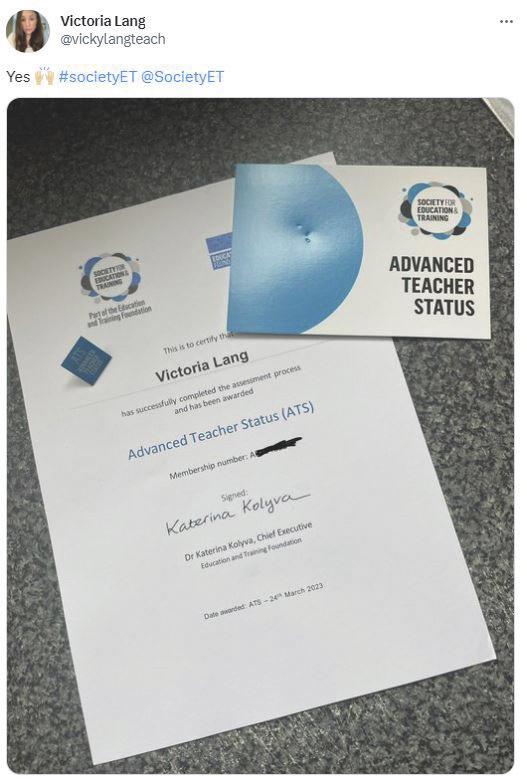
Ican’t believe we are halfway through the year already, and we are also coming to the end of the first quarter of our new membership year. While our annual renewal campaign seems an age ago, I wanted, on behalf of the SET team, to thank you for renewing your membership and for being part of our fantastic community of FE teachers and trainers.
The first three months of the membership year have seen the introduction of SET Mentor Me, our new mentoring platform, and the launch of our new Honorary Fellowship Award. Details of both are on the website, so log into your MySET dashboard for more information.

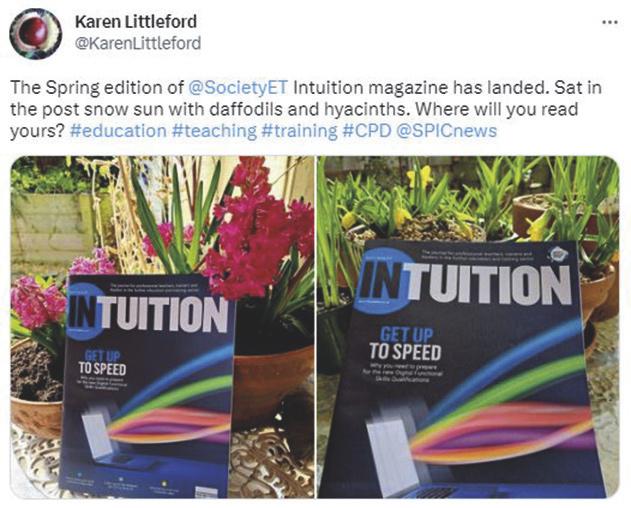
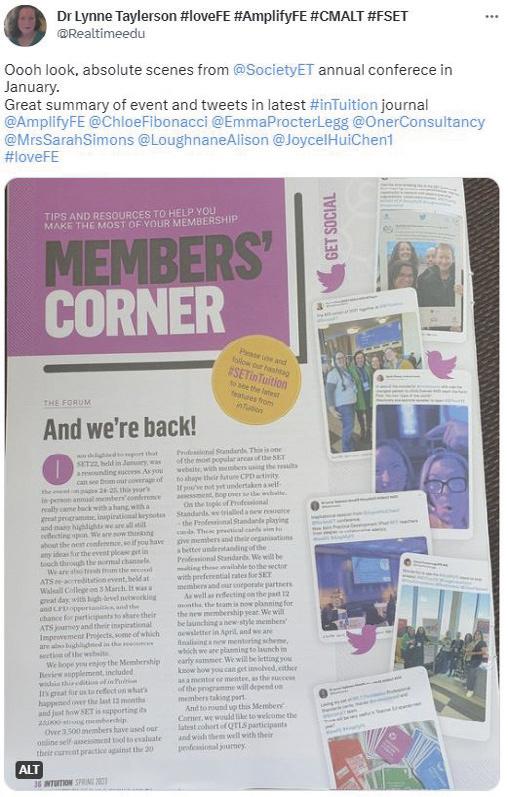

We also unveiled our new look members’ newsletter InSight – the name chosen by our members. It’s a monthly summary of news and updates, and a great way to keep in touch with what’s going on. This is supplemented by our new monthly







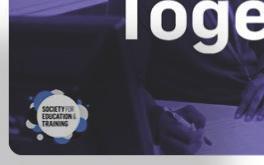







Events Digest so you can see, in a clear and concise way, what exclusive SET member events are planned. And if you are a student member, we hope you like Student Spotlight, the new look student round-up. Remember, as a member of SET, you are bound by our Code of Ethics and Conduct.

Unfortunately, from time to time, we are required to investigate alleged breaches of the code; if the allegations are upheld by the investigations panel, sanctions may be applied. Full details of the cases heard are published on our website, along with the full code.
On a brighter note, we are always looking for members who may be willing to host a webinar on a topic they feel passionate about, or members who wish to contribute to inTuition. If you want to know more, please contact us at membership@etfoundation.co.uk and a member of the team will be in touch.
JANE GALBRAITH is head of membership at SET
followPleaseuseand ourhashtag #SETinTuition toseethelatest featuresfrom inTuition
GET SOCIAL
‘I WANTED, ON BEHALF OF THE SET TEAM, TO THANK YOU FOR RENEWING YOUR MEMBERSHIP AND FOR BEING PART OF OUR FANTASTIC COMMUNITY OF FE TEACHERS AND TRAINERS’












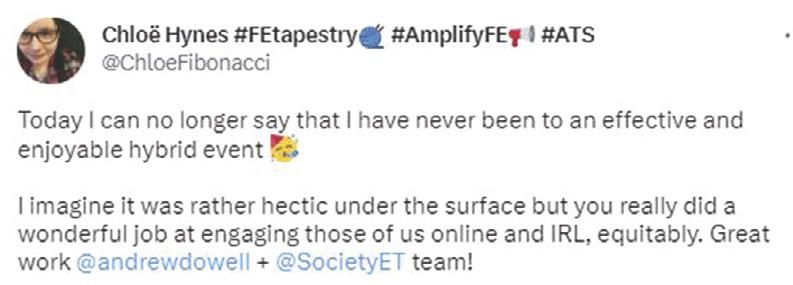
The SET team are currently looking at how we can make the information we share with members more relevant to you. To help us do this, we are asking all members to align with one of four statements that we have published in MySET, your online members’ dashboard. Under ‘My Interests’ (where you can also manage your special interest topics) you’ll see four statements, from which you can choose the one that most closely matches with your perception of SET and how you hope to benefit as a member. While you’re there, please check your contact details and communication preferences to ensure they are up to date via the My Profile tab.





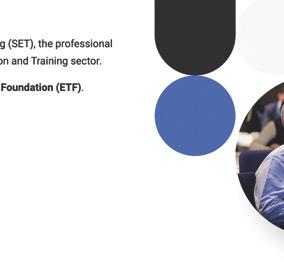







Our second Advanced Teacher Status (ATS) re-accreditation event was held on Friday 3 March, hosted by our corporate partner Walsall College. Listening to members’ feedback, this year’s event was hybrid, with 28 per cent of delegates attending in person and 72 per cent joining via Microsoft Teams.

This was a challenge for the organising team but it was nonetheless a successful event, which included a number of presentations and interactive workshop discussions that fell into the categories of developing learners, developing the organisation and developing colleagues, as well as updates from the Education and Training Foundation (ETF) and SET.
The delegates were a mix of members who had recently been awarded ATS and those who achieved it some time ago. It was a day full of lively debate and discussion, as well as a practical session in Walsall College’s Forest School. One delegate’s feedback captured the spirit of the day: “The event was very informative and a great way to network with peers.”
It is a requirement that all ATS holders re-accredit their status every three years; our next event is planned for 8 March 2024, so save the date!
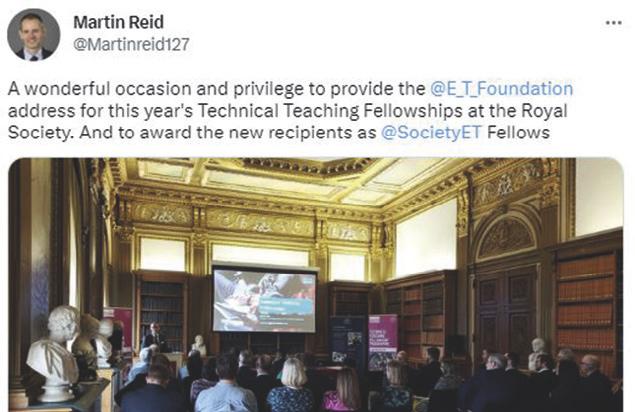



How did you first get into teaching?
I always knew I wanted to be a teacher and was fortunate enough to be given an early opportunity to undertake some lecturing in further education (FE), initially teaching equine management and science at a land-based college. At the same time, I was also working towards my specialist coaching qualifications and as an instructor at a local riding centre.
Why did you feel this was the career for you?
I was inspired by lots of great teachers at school and always knew I wanted to do something people-focused. I had spent most of my late teenage years and 20s working as an equestrian coach, and have always loved seeing others learn and grow.

Where has your career taken you so far?
In many directions, but all within education! Starting out as an equestriancoach, I also spent many years lecturing within FE and higher education. Then, in 2012, I took over management of the Royal Borough of Greenwich Equestrian Centre in London, one of the London 2012 Olympic legacy sites. This was an amazing opportunity, which provided those in the London area access to land-based education and equestrian sport.
From there, my love of coaching and developing others led me to the role of advanced learning practitioner and teacher educator at the Hadlow Group, where I spent many years coaching and mentoring teachers at different stages of their careers.

From there, I went on to work as a digital learning coach at Plumpton College in
horses
Lauren Harris into a career in further education, coaching and now delivering apprenticeships at a training provider
Sussex, supporting teaching staff with online teaching during and after the pandemic, while also running my own freelance consultancy business. It was through this that I started working for Runway Training in Kent, initially in a consultancy role, before joining them full-time as apprenticeships manager.
What is your current position?
I am now head of apprenticeships, schools and Runway Futures, working within the senior leadership team at Runway Training.
I am also an apprentice myself, working towards the level 7 senior leader programme.
Can you run me through a typical day?
There is no such thing as a typical day at a training provider, although my favourite kind of day is one where I am out and about visiting employers and learners. I also love getting back into the classroom to teach, deliver staff training or provide coaching.
What are the biggest challenges you face?
One of my biggest challenges working in apprenticeships is that they are still vastly underrepresented, particularly within schools and certain job sectors. As an apprentice myself, I understand first-hand the benefits that the programme brings.
It can be a challenge for us as a training provider to change old perceptions of apprenticeship programmes. We are constantly challenging these through our work with schools and employers.
How has the QTLS qualification helped you?
I completed QTLS in 2010 and started ATS in 2020 before my career changed direction, away from teaching and into management at senior level. Both provide significant opportunity for reflective practice.
What one piece of advice would you have for your former self?
Don’t sweat the small stuff – every day is a learning opportunity!
What do you get up to outside work?
I have a busy time looking after my young family, but I do find time to enjoy exerciseclasses and walk my lovely labrador!

If you would like to be featured in My Life in Teaching, email intuition@redactive.co.uk

A passion for
ledLAUREN HARRIS is head of apprenticeships, schools and Runway Futures at Runway Training
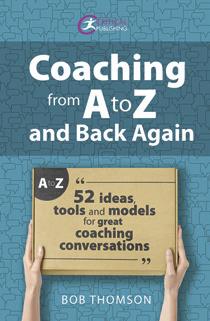
 ByBobThomson
ByBobThomson
Critical Publishing 2023

This book contains a lot of useful tips and ideas for great coaching conversations, arranged in alphabetical order of 52 short chapters.
It is written by a well-respected author and coach, with prior experience of management before entering academia.
The topics cover all the basics of coaching, including wellestablished practices and useful key ideas from published work across the field.
Each chapter is easy to read, with further suggestions of reading or reflective tasks to extend the concepts.
I feel that this would be a very good reference for any coach or educator.
It is well written and structured, with good links between the chapters, and it is packed with information and ideas.
I did find it was something I could not read a lot of in one sitting because I wanted to take in and reflect on what I had read, especially concerning the more thoughtprovoking topics.
This means it is not a quick read, despite the compact appearance, but it will be a valuable addition to my bookcase to dip into when required.
ByPeterMattock
Crown House 2023
Our reviewer is DR ANNE DAVIS MSET QTLS , who has worked as a sixth-form maths teacher and head of maths in south-east England. She is also a private tutor, teaching maths, chemistry and physics, specialising in the 16+ age group. She is a cycling and kayaking coach, with experience of coaching disabled athletes

I liked the idea behind this book as soon as it landed on my doorstep.
As a maths teacher, I am always looking for new ways to help my students learn, and regularly go back to the basic concepts to build up an understanding of the processes required.
The idea of teaching about the background concepts of maths, rather than just ‘doing’ maths, is the fundamental goal of this book.
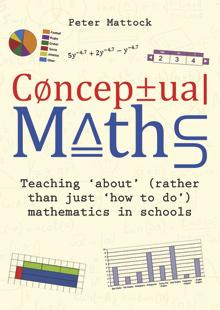
It contains lots of explanations supported by established and sound models, and demonstrated with excellent examples.
This book is big but well structured and organised into chapters based on the main areas of study.
It is clearly aimed at educators rather than students – but there is no reason why parents or older students could not benefit from it themselves.
It is aimed at all stages of education and would be a useful resource for any further education (FE) maths teacher – especially where working with learners who have struggled with maths GCSE or functional maths.
The author is an experienced teacher and presenter who is clearly passionate about education and the mastery of his subject. While this book has clear links to the author’s previous publication, it is a very useful resource.
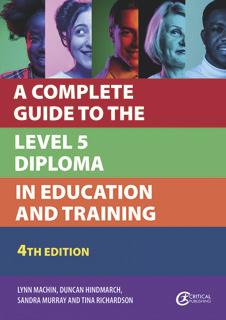
I reviewed the third edition of this book in 2020 and rated it as an excellent book. Like its predecessor, this edition doesn’t disappoint.
It has updated policies and recommendations that reflect current legislation and views on best practice in the FE sector.
It feels a bit slimmed down compared to the previous edition, but there is no reduction in the standard of content.


The topics covered are linked to the 2022 ETF standards. Each chapter contains details examining the key areas of practice accompanied by highly relevant case studies for today’s trainees, which also address common concerns and issues facing all educators.
There are tasks to check on understanding of these practices, which I thought were very good.
The different topics link up well to the DET courses, which will be very useful for trainees. The different routes that can lead to the DET qualification are well represented in the case studies and scenarios, and the background of the course and future prospects following qualification are also well explained.




























